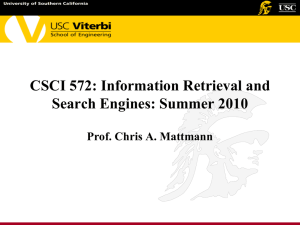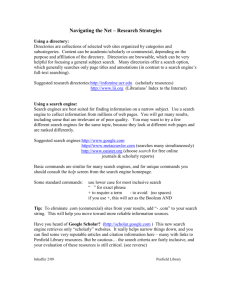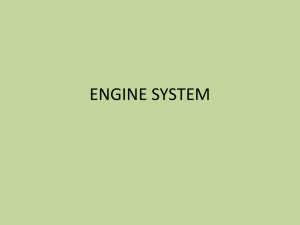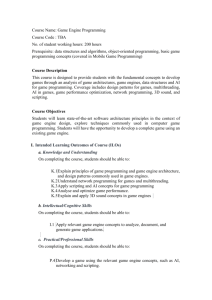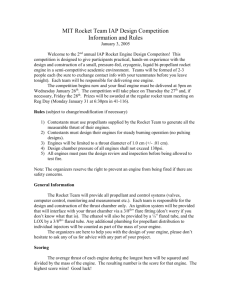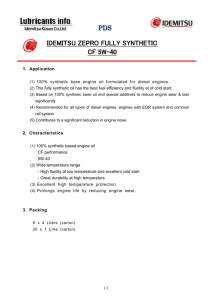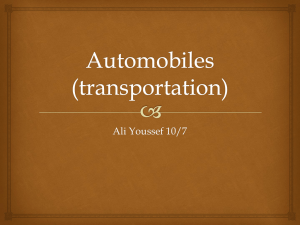Course Syllabus Small Engines Mr. Sullivan Instructor Course
advertisement
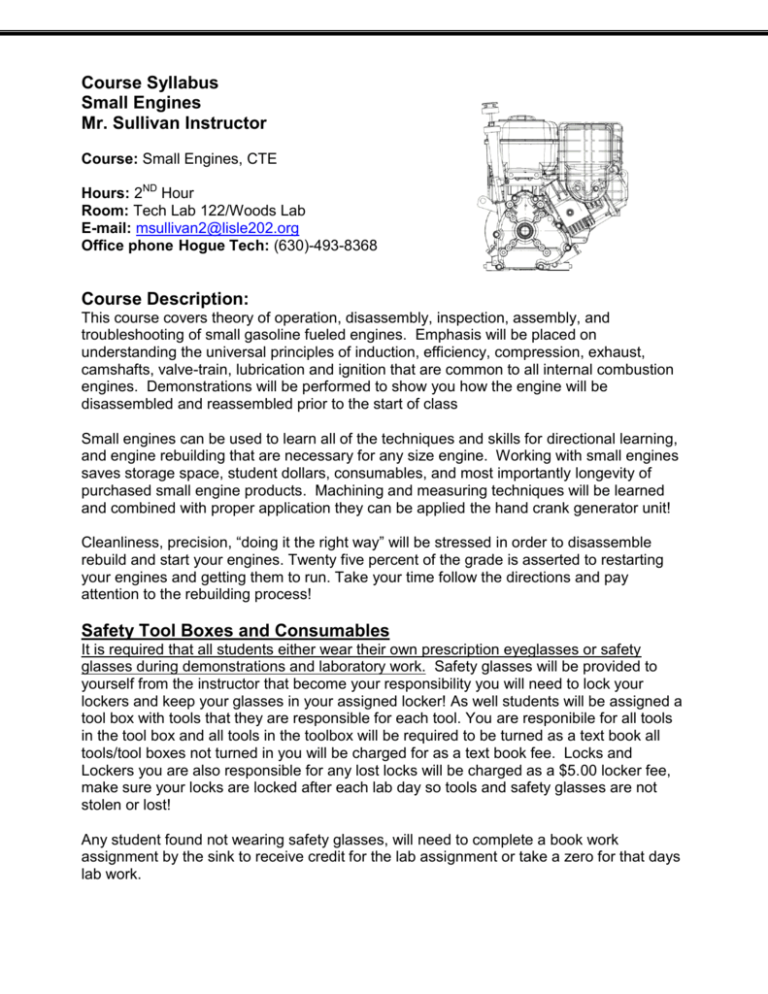
Course Syllabus Small Engines Mr. Sullivan Instructor Course: Small Engines, CTE Hours: 2ND Hour Room: Tech Lab 122/Woods Lab E-mail: msullivan2@lisle202.org Office phone Hogue Tech: (630)-493-8368 Course Description: This course covers theory of operation, disassembly, inspection, assembly, and troubleshooting of small gasoline fueled engines. Emphasis will be placed on understanding the universal principles of induction, efficiency, compression, exhaust, camshafts, valve-train, lubrication and ignition that are common to all internal combustion engines. Demonstrations will be performed to show you how the engine will be disassembled and reassembled prior to the start of class Small engines can be used to learn all of the techniques and skills for directional learning, and engine rebuilding that are necessary for any size engine. Working with small engines saves storage space, student dollars, consumables, and most importantly longevity of purchased small engine products. Machining and measuring techniques will be learned and combined with proper application they can be applied the hand crank generator unit! Cleanliness, precision, “doing it the right way” will be stressed in order to disassemble rebuild and start your engines. Twenty five percent of the grade is asserted to restarting your engines and getting them to run. Take your time follow the directions and pay attention to the rebuilding process! Safety Tool Boxes and Consumables It is required that all students either wear their own prescription eyeglasses or safety glasses during demonstrations and laboratory work. Safety glasses will be provided to yourself from the instructor that become your responsibility you will need to lock your lockers and keep your glasses in your assigned locker! As well students will be assigned a tool box with tools that they are responsible for each tool. You are responibile for all tools in the tool box and all tools in the toolbox will be required to be turned as a text book all tools/tool boxes not turned in you will be charged for as a text book fee. Locks and Lockers you are also responsible for any lost locks will be charged as a $5.00 locker fee, make sure your locks are locked after each lab day so tools and safety glasses are not stolen or lost! Any student found not wearing safety glasses, will need to complete a book work assignment by the sink to receive credit for the lab assignment or take a zero for that days lab work. The Power Tech Lab provides an extensive set of tools, however, specialty or a good set of hand tools may make your day much smoother. Secure storage is available for student use. Each student must provide their own supply of: o Shop towels (Al’s, Car Quest, NAPA…) o Shop apron, coveralls, or shop coat (used from Autozone, Car Quest!) o Small containers for parts and pieces (boxes, bags, reused cans…) (It is strongly recommended that any student working on a typical “small engine” also purchase the appropriate manual for that engine (Honda, Tecumseh, Kohler, Onan, Wisconsin, Kawasaki, etc.) The Power Lab is only equipped to handle Briggs and Stratton engines. As a side note horizontal shaft engines are preferred to vertical shaft designs, but this is to be taken as a recommendation not a requirement.) Course Topical Outline: 1) General Principles of internal combustion Engine Operation i) Stroke vs. Cycles 2) 3) 4) 5) ii) Thermal principles iii) Bore, Stroke iv) Volumetric Efficiency Nomenclature i) Piston ii) Connecting Rod iii) Rings iv) Camshaft v) Crankshaft vi) Magneto vii) Lifters viii)Rocker arms and followers ix) Valves x) Valve springs xi) Valve retainers xii) Valve guides xiii)Valve retainers xiv) Flywheel xv) Timing gears, chain or belts System Functions i) Fuel ii) Pressure systems iii) Lubrication iv) Ignition v) Cooling (Precision Measurements) i) Valve Lift/Lashing ii) Combustion chamber volume iii) Armature clearance iv) Ring side clearance v) Runout and out of round vi) Fasteners Carburetor Competency Checklist a) Show the choke b) Show idle speed screw adj. c) Show high speed screw d) Trace air flow path e) Explain action of float/needle assembly Show the throttle Show idle mixture screw Show high speed jet (main) Show fuel paths Show main and idle fuel flow paths Course Objectives: At the conclusion of the course the students will be able to: 1. Define the concepts of bore, stroke, cycles, compression ratio, volumetric efficiency, displacement, thermal efficiency. 2. Disassemble, and reassemble a small gasoline engine such that; (a) all parts are assembled correctly, (b) all fasteners are torqued correctly, (c) no threads are stripped, and (d) the engine runs and accelerates without hesitation. 3. Operate the following hand tools; combination wrenches, sockets, ratchets, torque wrench, ridge reamers, ring expanders and compressor, valve spring compressor, valve seat cutter 4. Operate the following precision measurement instruments; feeler gage, wire gage, dial indicator, telescope gage, small hole gages, dial calipers, micrometers. 5. Operate the following diagnostic and test equipment; compression tester, and spark tester 6. Explain correlation concepts such as reciprocating and rotating motions that correspond to ignition, exhaust, intake, valve timing, and balancing 7. Identify correctly 20 parts of a small gasoline engine. 8. Tune and adjust the idle, low speed, and high speed circuits of the carburetor. 9. Detect runout, out of round, and calculate the clearance between shaft and plain bearing. Course Assignments: Written Examinations—3 @ 20% seniors A 4 exams for all else Engine Restoration—60% Participation — 20% Students following the labs working on their engines will receive all participation points for that day each day a l This will be done as per the Task Completion Record. All tasks will be completed in line with the Mastery Learning approach, where 100% mastery must be achieved by each student. The student should have his/her own engine(if you decide that you want to rebuild or fix an old engine that does not run). The workspace should be clean and organized, operations will need to be scheduled, and storage systems of new and used parts will be developed by each student. If you complete all tasks early, you are free to work with others to allow them to achieve mastery of the designed objectives listed above! Grading Evaluation: This course is designed around a value system for each assignment. Each learning assignment has been weighted and assigned a certain percentage portion based on: the amount of work required/creativity required/importance to professional development/relative value of cognitive vs. psychomotor vs. affective domains. Missed labs and participation due to absences can be made up after school before school or by completing book work! Grading Procedure: 1. All assignments will be turned in on the day designated during class time for the course. 2. All written work will be evaluated on the following criteria: a. content quality b. completeness c. clarity 3. Please ask questions if assignments are unclear. The final responsibility for misunderstandings and late work rests with the student. 4. Points will be assigned for each student’s work. The total points obtained throughout the course will then be evaluated according to the following chart: A 100-93% B 92-85% C 84-80% D 74-67% 5. Missing class is not “OK”. Discussion questions, safety instruction, and instruction on equipment and instruments are all valuable and should not be missed. Absences cause expensive wear and tear on equipment, supplies and facility. Demonstrations on equipment and technique are difficult to be given over. 6. Appointments can be directly made with the instructor or E-Mail. 7. Grades will be determined by attendance patterns, completion of labs, participation and performance on written and constructive projects that demonstrate learning Absences: If you are absent from class, you need to turn in your CLASSWORK when you return. Any new assignments that were made during your absence will be due the following day (one day for each absence). If you know that you will be gone in advance, please make up your work ahead of time. It is your responsibility to check with me at the beginning of class if you will be/have been absent from class. You will be granted an extra day for each day absent that will not count against your grade. Late Work Students who have late assignments are expected to finish the assignments one week after the due date. I understand that you may have miss a due date but want to see you complete the assignment as each assignment is purposeful to the class. I would not assign something that does not need to be completed. Therefore a student has up to one week to complete the assignment for full credit and after one week the student can submit the assignment for 80% of the total grade possible. You will be assessed as you would on the same rubric for each assignment so you are expected to complete work with the same expectations as all of the other students. ADA: Students who have special needs or disabilities that may affect their ability to access information and / or material presented in this course are encouraged to contact the instructor or the special education department Small Engines Course Reading / Assignment Schedule (Keyed to Small Gas Engine Repair, Paul Dempsey) Week # Topic Assignments Due 1 Safety Unit and Hand Tools 2 Engine Theory 4 Stroke 3 4 Engine Theory 4 Stroke 4 stroke Small Engine disassembly 5 4 stroke Small Engine disassembly 6 8 9 4 stroke Small Engine reassembly 4 stroke Small Engine reassembly Key Train 2 Stroke Theory Tools Test Guided W.S. Reading Activities Short answer questions Test “ Ignition systems Reading Valve Timing Reading Disassembly Labs Ignition systems Reading Valve Timing Reading Disassembly Labs Rebuilding Labs 10 2-stroke Disassembly 11 2-stroke Reassembly 12 13 2stroke engine start Electricity Unit 14 Electricity Unit 7 Rebuilding Labs Start & Run engines Key Train 2-Stroke reading activities 2-stroke written activities 2-stroke Test 2-stroke labs 2-stroke written assignments 2-stroke labs 2-stroke written assignments Start 2-stroke engines Bread Boards Electricity flow Measuring electricity AC vs DC Reading Bread Boards Electricity flow Measuring electricity AC vs DC Reading 15 Build Hand crank generators in the lab 16 Build Hand crank generators in the lab 17 Wind Generators 18 Wind Generators Assembly of hand crank generators, mechanical features Assembly of hand cranks generators, mechanical features. And assembly of electrical, trouble shooting Build wind generators to charge small devices Build wind generators to charge small devices Guardian Signature ______________________________________________ Student Signiture ________________________________________________

